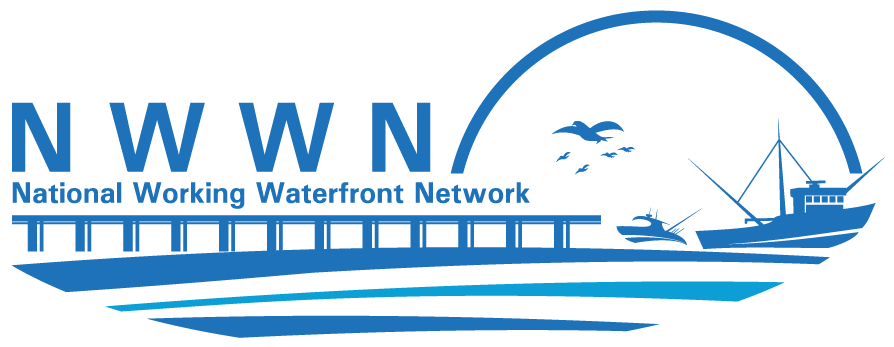
26 Jun Planning for the Future: A Tool to Inventory Working Waterfront Infrastructure, Assess the Local Economy, and Preserve Coastal Access in Maine
Written by Shannon Hogan, Urban Harbors Institute
Working waterfronts are vital to the preservation and prosperity of coastal communities. They support several water-dependent activities including fisheries, coastal tourism and recreation, marine transportation, and energy, etc.
While it’s no surprise that coastline property is highly covetable, the population increase and threat of climate change, have created a “coastal squeeze”. More people moving to the coast means more private waterfront property, and the threat of rising seas and erosion from coastal flooding in combination with hardening the shoreline for protection is impacting the availability of shorelines. The recent COVID-19 pandemic has intensified this waterfront privatization as lifestyle changes, such as the flexibility to work from home, have drawn families to the coast. The state of Maine, especially, has experienced an influx of out-of-state home buyers along the coast in recent years leaving working waterfront industries competing for waterfront space.
The Maine Coast Fishermen’s Association recognizes the challenges that coastal communities in Maine are facing along their working waterfronts and with assistance from Tidal Bay Consulting, the project team conducted research into how towns are incorporating working waterfronts into town planning. The resulting report, the Working Waterfront Inventory Template, was written by Monique Coombs, MCFA’s Director of Community Programs; Jessica Gribbon Joyce, Principal of Tidal Bay Consulting; and Josee Stetich, a Resilience Corps Fellow with the of Greater Portland Council of Governments. The following summarizes an interview with MCFA’s Monique Coombs and Tidal Bay’s Jessica Joyce, reflecting on the work of the Working Waterfront Inventory Template and other current initiatives supporting Maine’s coastal communities.
Laying the groundwork for the Working Waterfront Inventory Template
After a previous study conducted by MCFA, which utilized anecdotal stories and interviews to get a snapshot of 12 different coastal communities (in Maine) and the issues they were experiencing, Coombs says, “We realized how important it was to build a foundation in coastal communities and look at what existed for infrastructure in working waterfronts.”
She continues, “You can’t protect what you don’t know you have,” in reference to the lack of inventory analysis of working waterfront infrastructure, especially private infrastructure that services public fisheries (and may be overlooked by municipalities in their planning documents).
From there, Coombs and Gribbon Joyce began to talk once a month discussing the conflicts they were hearing about within coastal communities, ranging from waterfront access to gear storage. Through those conversations, “We started to brainstorm ideas around what we might be able to do to help communities” says Coombs.
Preliminary research involved looking into which coastal towns had comprehensive and/or harbor management plans, what those plans included, and if working waterfronts were incorporated. However, as Coombs notes, “A working waterfront can mean different things to different people,” and so the work expanded. The final product contains best practices for how to prioritize and preserve working waterfronts in town planning through ordinances; and a standardized data collection process for towns to conduct an inventory of their own working waterfronts. To see the entire Working Waterfront Template, click here.
A major challenge faced along the way
“Data.” says Gribbon Joyce, “Some data are harder to get than others.”
She continues, “In our research of existing comprehensive plans, we found that Towns may have data for only a couple of fisheries (e.g., lobster or clams), although they don’t consider federally-managed fisheries, like groundfish or herring, or the interconnected nature of many fisheries that are managed by both municipal, state, and/or federal agencies, which can all have different data sets and licensing structures.” Coombs and Gribbon Joyce also ran into issues with obtaining certain social, economic, and census data because of confidentiality restrictions with data from small towns in Maine.
In addition, in the state of Maine, towns are not required by law to have a comprehensive plan or harbor management plan and thus some digging had to be done to find towns with updated plans. After speaking with Maine’s Municipal Planning Assistance Program, Gribbon Joyce learned that “To access state funding or to support place-based zoning, it is in a town’s best interest to have a comprehensive plan.”
“We worked with the Atlantic Coastal Cooperative Statistics Program and Maine’s Department of Marine Resources to figure out the best [data] resources to use,” continued Gribbon Joyce. The final report addresses the limitations of obtaining certain types of data, and provides resources for how to access fisheries and census data.
Using the Working Waterfront Inventory Template
“Our hope is to see communities use the template to identify needs of the working waterfront and ways to protect it, and this work is very relevant now because of how coastal communities are changing,” says Coombs. Currently, there are already a few towns in Maine using the template to conduct a waterfront needs assessment and for developing a new comprehensive town plan.
The goal is for the template to be accessible to any coastal community and provide them with the tools to conduct their own inventory analysis of working waterfront infrastructure. “We want any town planner or volunteer on a town committee, who may not be an expert on fisheries, to be able to access the data and utilize the template,” says Gribbon Joyce. Both Coombs and Gribbon Joyce agree that the template also empowers the process of communication between town planners, commercial fishers, and other waterfront users.
Looking ahead, Coombs and Gribbon Joyce would like to obtain funding to provide technical assistance to coastal communities using the template. “Funding at the state level for working waterfront initiatives [related to inventory analysis and town planning] is fairly limited in Maine,” says Gribbon Joyce.
Anyone with questions or concerns regarding how to use the template can reach out to MCFA or Tidal Bay Consulting for assistance.
Outcomes and impacts
One form of outreach included presenting at the Maine Fishermen’s Forum. “We were on a panel that discussed planning and preservation tools” says Coombs. Through this, they got to share the Working Waterfront Inventory Template and how it can be used in planning for working waterfronts.
This panel and other conversations at the Forum have led to more discussions focused on coastal access, including shellfish harvester access, and preserving the working waterfront around fisheries. Coombs and Gribbon Joyce have been convening stakeholders in their region to identify other initiatives including developing a model ordinance for working waterfronts, considering new tax incentives, and sharing language for municipal zoning ordinances that would provide incentives to developers that maintain public waterfront access.
Highlighting other MCFA and Tidal Bay Consulting initiatives focused on coastal communities
Recently, following a series of 10 working waterfront panels with coastal communities in Maine, the MCFA created a guide to educate current and new community members about living and working on the ocean. The guide, “Scuttlebutt: How to Live and Work in a Waterfront Community” focuses on the coastal town of Harpswell and provides information on the different fisheries in the town, tips for minimizing impacts on the coastal environment, and how to preserve access along the working waterfront for future generations.
Coombs and the MCFA are also focused on fishermen’s wellness, “Mental health for commercial fishermen is tied to the working waterfront,” notes Coombs. While the value of a working waterfront is often measured economically, there are other types of metrics and impacts the working waterfront has on a coastal community. Coombs would like to dive deeper into this idea and identify further funding sources to continue researching ways to support the working waterfront and its infrastructure.
Gribbon Joyce is currently coordinating with the Chamber of Commerce in Yarmouth, Maine around their annual three-day that includes art, rides, seafood, a clam shucking contest, and other activities. She is currently working with a group of non-profit organizations and the University of Maine to increase public awareness around the clam fishery, past and present.
“We are collaborating on a few additions to help festival goers understand the culture and history of the fishery, including understanding how the fried clams get from the tide to your table,” says Gribbon Joyce. She continues, “It’s a different type of work but also really important to create public awareness and address issues around commercial access to the shore and use of the working waterfront.”

Monique Coombs is the Director of Community Programs at the Maine Coast Fishermen’s which is a non-profit organization working to enhance the sustainability of Maine’s fisheries by advocating for the needs of fishermen and environmental restoration in the Gulf of Maine. She has family ties to the commercial fishing industry which sparked her passion for working with the commercial fishing community and focusing on fishermen’s wellness.

Jessica Gribbon Joyce is the Principal of Tidal Bay Consulting, which supports research and convening around fisheries policy, ocean conservation, and climate resilience. Her interest in working with the commercial fishing community began while obtaining her bachelor’s degree when she had the chance to work one-on-one with spiny lobster fishermen in the Florida Keys, which she says shaped much of her career in fisheries policy.

